With in context
« previous post | next post »
John Wells, "with, regretful", 10/19/2012:
I found myself being just a tiny bit querulous when commenting on a posting in Language Log. […]
In reply Mark Liberman, the usually very knowledgeable writer of the post in question, said just
Short answer: I don't know. I've never heard a discussion of this point of pronunciation variation, except with respect to the varieties of English that have [wɪf] or [wɪv].
There followed a string of commentators reporting what they said or what this or that dictionary reported.
Finally I felt I must chip in:
Doesn't anyone ever consult my Longman Pronunciation Dictionary? There you will find both preference statistics and graphs for wɪθ and wɪðin both American and British English. Also a note mentioning that "in Britain, wɪθ is nevertheless frequent in Scotland" – again, with statistics.
Why do I bother, if no one reads what I write?
I suppose the problem is in the phrase “finding it online”.People now no longer look for information in books, or in libraries: they expect to be able to locate it in in Wikipedia or via Google. They don’t want the inconvenience and expense of buying a book or locating the book in a library.
So the only way I can reasonably expect to disseminate the research I carried out into whether people prefer wɪθ or wɪð is indeed to put it online, which I shall now proceed to do, Here’s the entry for with from LPD.
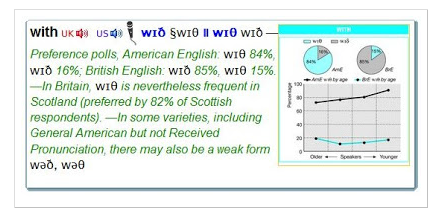
In my defense, I will note that my little "How to pronounce with" post was written in haste as I was about to head out to the airport to fly to Amsterdam (ironically, for a committee meeting to discuss plans for a conference on "Patterns of macro- and micro-diversity in the languages of Europe and the Middle East"). I do own a copy of LPD, but frankly I'm not sure which of 15-20 bookcases in which of several places it's in, and I didn't have time to look for it. So I worked from (as it turns out not very well informed) memory, and from those resources I could quickly find online.
And wouldn't it be nice if LPD were online? Pearson now owns Longman, I believe — they've got the expertise to do it easily, and the marketing muscle to monetize it. But maybe not richly enough, I don't know…
Anyhow, I had a spare hour today in Amsterdam, and I happen to have the TIMIT database on my laptop, so I thought I'd take a look at what it tells us about American pronunciations of with in various contexts, at least as of the time it was recorded (circa 1986).
Some results were not very surprising. Thus in 21 repetitions (7 each) of three sentences where with was followed by a or an, there were 6 instances of voiced with, for 6/21 = 28.6% voiced with. (The sentences that I checked were "Seamstresses attach zippers with a thimble, needle, and thread", "The misquote was retracted with an apology", and "Remove the splinter with a pair of tweezers".)
In 28 repetitions (7 each) of four sentences where with was followed by a vowel-initial content word, there were 9 instances of voiced with, for 9/28 = 32.1% voiced with. (These sentences were "Cooperation along with understanding alleviate dispute" [sic], "Cory attacked the project with extra determination", "Etiquette mandates compliance with existing regulations", and "The local drugstore was charged with illegally dispensing tranquilizers".)
In these examples, the voiced intervals may look something like this:
Audio clip: Adobe Flash Player (version 9 or above) is required to play this audio clip. Download the latest version here. You also need to have JavaScript enabled in your browser.
In the voiceless examples, the consonantal interval may be realized as a voiceless interdental fricative, or as a voiceless unaspirated dental stop (as in "attacked the" above), or as a combination of the two.
21 repetitions (7 each) of three sentences containing the word without showed 6 instances of voiced with, for the same 28.6% voiced. ("Alice's ability to work without supervision is noteworthy", "Did Shawn catch that big goose without help?", "It's healthier to cook without sugar".)
Something odd: Out of 12 sentences containing within (one set of 7, and 5 singletons), there were no instances of voiced with, though there was one example in which the medial consonant was simply a voiced tap, as though it were spelled "widdin".
Something odder: In 21 repetitions (7 each) of three sentences containing the sequence "with the", there was just one (extremely reduced) case where the consonant sequence was realized as voiced throughout. In all the other cases, not only was the final consonant of with voiceless, but also the initial consonant of the was phonetically voiceless as well. In some cases, the whole interval (more or less) was realized as a voiceless interdental fricative, as here:
Audio clip: Adobe Flash Player (version 9 or above) is required to play this audio clip. Download the latest version here. You also need to have JavaScript enabled in your browser.
A close-up:
In other cases, the interval became a voiceless unaspirated dental stop:
Audio clip: Adobe Flash Player (version 9 or above) is required to play this audio clip. Download the latest version here. You also need to have JavaScript enabled in your browser.
A close-up:
And there are mixed cases, with bits of frication before and/or after a stop-like region.
That one voiced "with the" case was reduced to the point where it becomes homophonous with "with a":
Audio clip: Adobe Flash Player (version 9 or above) is required to play this audio clip. Download the latest version here. You also need to have JavaScript enabled in your browser.
Everywhere else, the medial consonant sequence in "with the" becomes completely voiceless, either by some sort of progressive assimilation, or because initial /ð/ in American English is often realized as a voiceless unaspirated dental stop (which of course makes it similar to the other "voiced" stops…)
There's also the question of vowel duration in with — in American English monosyllables, timing is often the strongest cue to final-consonant voicing. But I've run out of time for today.
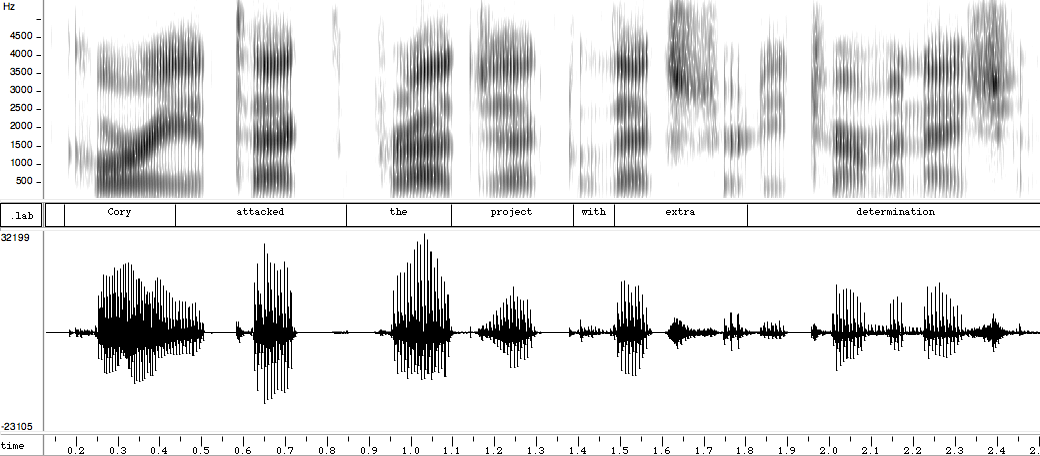
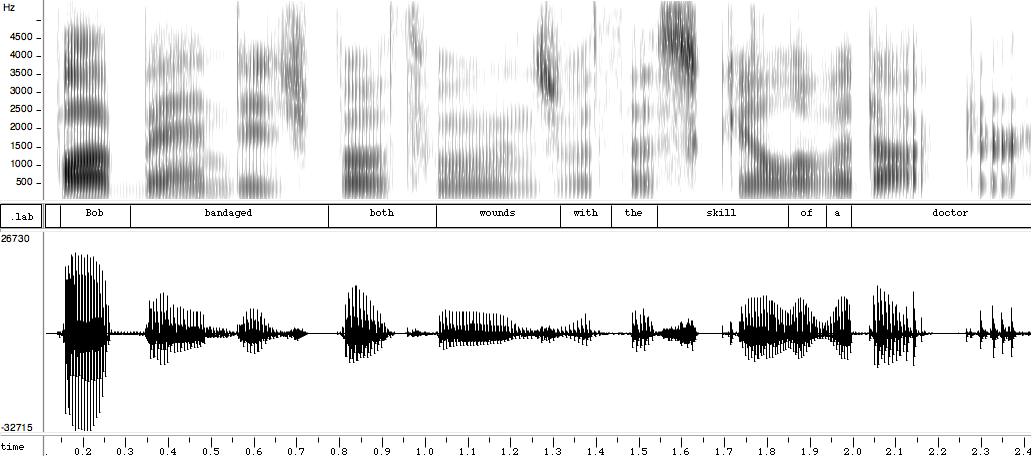
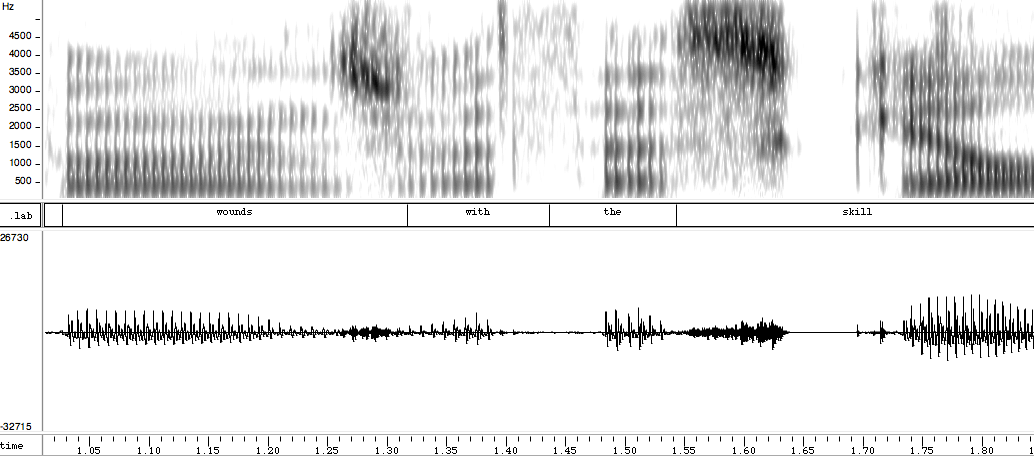
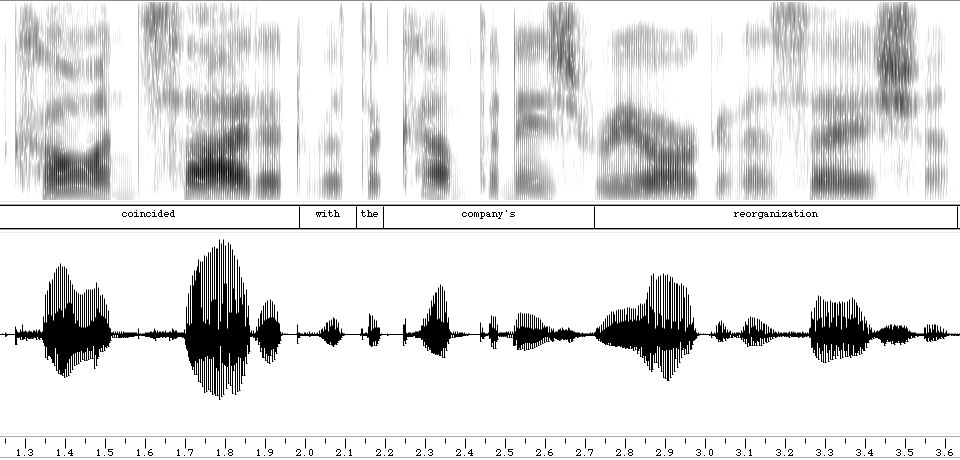
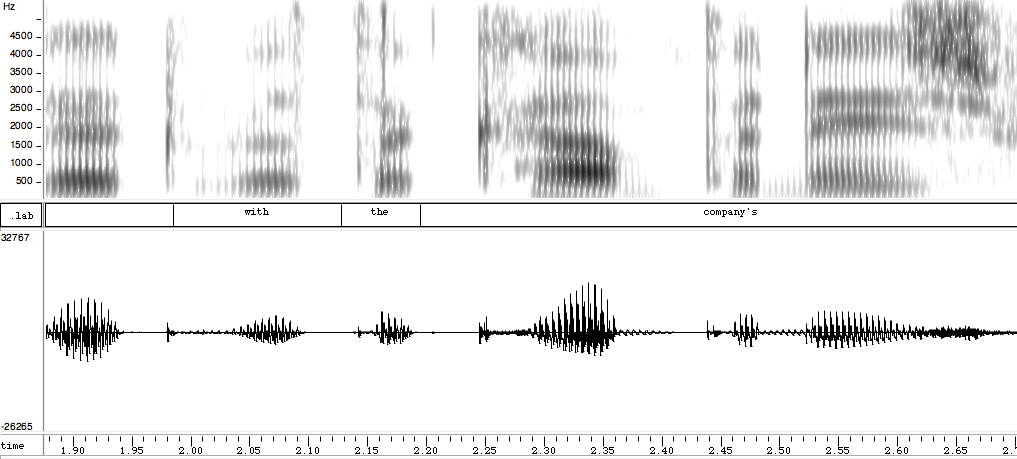
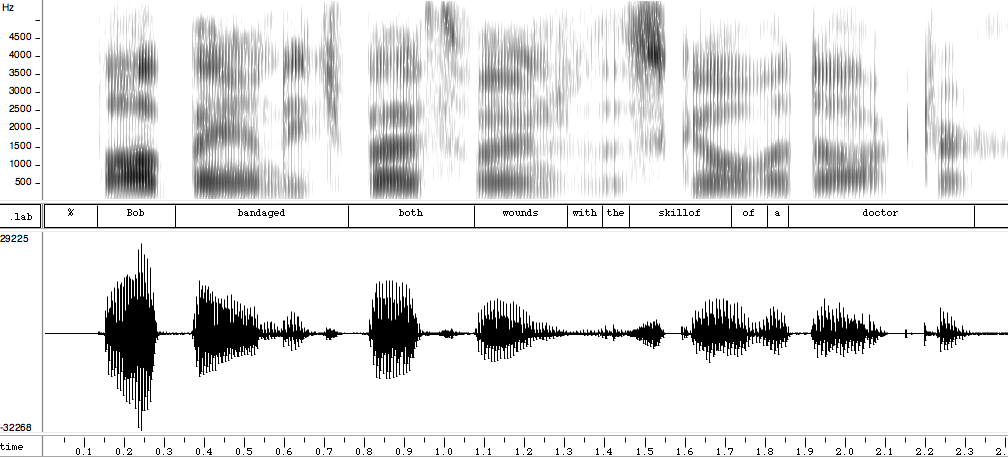
Simon Fodden said,
October 20, 2012 @ 2:16 pm
Sigh. Now I'm wondering whether your title is a mondegreen or whether it's mischief. Because the phrase from the Dylan song is "Come all without, come all within"…
[(myl) Well, I wouldn't want to distract you from the fascinating questions of phonetic variation featured in the body of the post, so I've changed the title to "With in context" :-)…]
Harry Campbell said,
October 20, 2012 @ 2:48 pm
"And wouldn't it be nice if LPD were online? Pearson now owns Longman, I believe — they've got the expertise to do it easily"
Ah, the innocence. A thing can be put online, so why shouldn't it just happen, to spare me the minor inconvenience of using the book or even the CD? Don't tell me highly-qualified people actually make their living working on dictionaries? Hey, it's all just data.
GAC said,
October 20, 2012 @ 4:16 pm
@Harry Campbell: Things that are online don't have to be free — they could charge a subscription fee if necessary, as the OED does.
[(myl) Exactly. I'm somewhat familiar with the economics involved, for reasons explained below.
Recently, the author of an excellent if specialized dictionary wanted to explore finding an online home for it (and its supplementary files) at the LDC, an organization that I direct. He had previously been turned down by the dictionary's current publisher, who (I gather) didn't have the technical capabilities that he wanted. But he needed a modest income from the enterprise. Although the LDC does derive income from selling linguistic data in digital form, including lexicons, our customers are mainly speech and language oriented R&D organizations, and the market for the dictionary in question ought to have been a much broader segment of the intellectual population.
We would have been happy to undertake to put it on the web, and to keep it there indefinitely, and to give him the access he needs to continue improving it. If he didn't want (and genuinely need) an income from it, that would have solved the problem. And for that matter, we would have been happy to charge subscription fees, and transfer the results to him. The problem was that we don't have a big marketing organization engaged in selling to every college and school system and public library, or for that matter to the public at large. And we don't have a bundle of content suitable for that market, or (for that matter) a mandate to develop one. So realistically, I couldn't promise him that he would get the (few tens of thousands of dollars a year) that he hoped to make. (I'm not sure whether the market is/was there for the income that he hoped for; but I'm very sure that we couldn't guarantee to find it for him.)
An outfit like Pearson is in a completely different situation. They have a pile of content and services that they already sell to various mass and semi-mass markets, some of it via online delivery; and they have a small army of salespeople to sell this stuff; and (properly presented and marketed) John's book ought to be an attractive addition to a bundle of subscription services to reference works that they could (but apparently don't) market in the way that Oxford Online does. Maybe someday they will. Or maybe… well, beyond this point is a morass of uninformed institutional and financial speculation.]
J.W. Brewer said,
October 20, 2012 @ 8:08 pm
I tend to assume that it isn't lavish royalties paid to John Wells that are responsible for the possible infeasibility of making this particular work available free on the web (although if I'm wrong about that, good for him and I hope he's spending it all on caviar and champagne).
[(myl) Amazon currently gives a sales rank of #369,218 for LPD, which (according to this source) suggests that they sell about 2 copies per week. There are, of course, other sales outlets; but overall, I doubt that John has derived a very high hourly wage for the time that he put in on this excellent work.]
Perhaps it's different in the UK, but in the US there's sort of a sense that well-compensated faculty at lavishly-endowed major research unversities are given light teaching loads precisely so (with a few exceptions who are actually stars in their own right from a literary agent's perspective) that they can generate scholarship theoretically useful to the world at large but which will generate zero to minimal direct payment to them from the journals or presses publishing the resulting articles/books. That (for many things of interest in fields like linguistics) some publishing house in the Netherlands or wherever should then charge hundreds of bucks/quid/Euros for the result w/o any meaningful portion of it flowing through to the author is widely agreed to be a quite serious problem (because it impedes widespread access to the resultant scholarship by the world-at-large) that many people are noodling around proposed solutions or partial solutions to, although we haven't gotten there yet. (I do see from their website that the Strand in NYC prices the dictionary in question at a quite reasonable $25 when they have copies in stock, which they currently don't.)
As a counterexample to the OED, it has been noted on this blog before that the proprietors of the MWDEU have made it available to anyone surfing google books in its entirety, for all the world like a competently-scanned pre-1923 public domain work, rather than just permitting access in limited teaser-snippet excerpts. I don't know if they figure they make up in good will what they lose in revenue or what the motivation is, but they're not a non-profit.
[(myl) Indeed. Another notorious laggard in this respect is Cambridge University Press. The Huddleston & Pullum Cambridge Grammar of the English Language would be much more useful if it could be searched and accessed on line — despite Geoff Pullum's excellent index, the unwieldy physical size of the book and the intrinsic inferiority of physical search often make it unreasonably hard to find something in there. But CUP seems entirely unmotivated to do anything to fix this problem.
What makes the problem difficult to solve, other than possible inattention and incompetence in the management of some publishing houses, is probably the combination of technical and marketing issues — and associated costs — with relatively small likely returns. (And also, I suppose, the likelihood that the effort would to some extent cannibalize the existing modest returns from paper-book sales: If my university library could give me online access to LPD via a subscription, why would I want to buy a physical volume as well?)
The best hope is probably that after the current business and technical leadership of these publishing houses has died or retired, a new generation of managers will casually decide to allow some future successor to Google Books to solve the problem for them, by virtue of folding all these works into a larger enterprise at low marginal cost (and also low net income, but by then they can pass it off as "monetizing the backlist", or even "generating good will" by allowing access to be free…)
And by that time, there will surely be some new model(s) for new academic publishing — though those changes will apparently come in the humanities last of all.]
Harry Campbell said,
October 21, 2012 @ 5:06 am
I apologise for my earlier sarkiness, but there does seem to be a lot of academic innocence about commercial realities. People often seem to assume that publishers exist to improve the sum of human knowledge, or in this case the accessibility of academic resources. In fact they are about making money. Could a highly specialist item like a pronouncing dictionary really make decent money online? When every bog-standard dictionary already on your shelf, or even free online, includes pronunciation? It seems unlikely to me, much as I'd love to be proved wrong. What tiny percentage of those who consult a generalist dictionary to find out how to say a word are interested or knowledgeable enough to want or understand the treatment given by a specialist pronounciation dict, and how much would they pay for that?
The OED is totally different, for many reasons, eg (1) It's the OED. Everyone's heard of it even if they haven't a clue what it actually is. Every two-bit journo or essayist wants to begin an article with a clichéd reference to how the "Oxford Dictionary" (or worse "The Dictionary") defines something. (2) Yes it is, effectively, free in the UK, through the public library system. I'd love to know many private individuals actually pay the monstrous £250 fee every single year to glance between its online covers. (3) It's a famous national treasure, built up largely through vast amounts of voluntary labour by contributors, backed today by public money in various forms not least the tax breaks given to university presses. Even so, OED have shown in the past how little they care about, what was the phrase, "generating goodwill". They don't want goodwill, they want money. They are a cash cow for the university and dare one say it, tax breaks or no tax breaks, quality is not the overwhelming concern. Meanwhile Pearson is a purely commercial operation.
Oxford Reference a huge package of many dozens of titles that you can sell on the basis of its impressive scope to generalists everywhere, not just to a handful of phonetics specialists. It's hard to imagine them putting online their Dictionary of Law Enforcement or Superstitions or Popes or "Insects and their Allies" as a stand-alone product and expecting it to make money. How many comparable titles could Pearson put into such a package, what would be the cost, and could this unfamiliar brand really compete with the revered "Oxford" that every consumer in the world seems to imagine is the natural leader in the field? I hope I'm just being cynical and that it will happen some day, but I'm not going to hold my breath.
michael farris said,
October 21, 2012 @ 12:24 pm
For what it's worth I didn't think John Wells' post was 'querulous' (or to the extent it was, it was perfectly understandable). It reminded me slightly a little of some of Geoffrey K. Pullum's posts where he righteously goes off on prescriptivists who don't understand the rules they're pushing.
Here's a discussion instigated by a professional linguist* with the participation (I assume) of some others theorizing about a question that has been researched and no one getting around to checking offline resources. If it had been my published work (and if I were a linguistics superstar) I would have been very annoyed.
*I understand the time constraints for that posting and the peculiar nature of online discussions and this i not meant as criticism of Mark. I was glad to see the issue discussed since as a decided non-voicer I was very surprised the first time I saw the voiced pronunciation in a dictionary.
dw said,
October 21, 2012 @ 1:19 pm
@Harry Campbell:
A little OT but I would like to add my voice to the criticism of the OED's individual subscription model.
I am in the unfortunate position of belonging neither to a university nor to a public library that has an OED subscription. I have seriously considered getting an OED subscription: I would be happy to pay something like $5 a month for access. At the prices the OED charges ($30/month or $295/year in North America) I can't imagine anyone other than a millionnaire philologist taking them up. I too would be very interested to know exactly how many individual subscribers the OED has.
J.W. Brewer said,
October 21, 2012 @ 1:48 pm
What I don't know is what the "preference poll" data is supposed to mean, how it breaks down by region/class/etc within the US, and how it would compare to spectrographic analysis of the actual speech of those polled. The old late '70's printing of the AHD which is the only hard-copy English dictionary in the same room as this computer gives both voiced and unvoiced pronunciations without any suggestion that one is regional or stigmatized or lower-prestige, but with the voiced one listed first, which seems odd if US preferences and/or usage are skewed so overwhelmingly the other direction.
Professor Wells in his linked blogpost suggests that "wit" might be heard from what he calls a "NooYorker" (perhaps non-rhoticism is interfering with what I would consider the standard eye-dialect spelling of "Noo Yawk"?) whereas I associate the "wit" variant with the environs of the UPenn campus, in particular as seen in the canonical South Philadelphia question "wit or witout?" (meaning "do you or don't you want grilled onions on that cheesesteak?"). Perhaps myl's distinguished colleague Profesor Labov has conducted relevant fieldwork? Is it significant that the standard eye-dialect spelling is not "wid or widdout"?
Mike said,
November 5, 2012 @ 9:18 pm
A little late to this, but here's real-live linguist clearly favoring the voiced version of "with".
http://www.youtube.com/watch?v=f3UpSsH3Tb0;t=90s